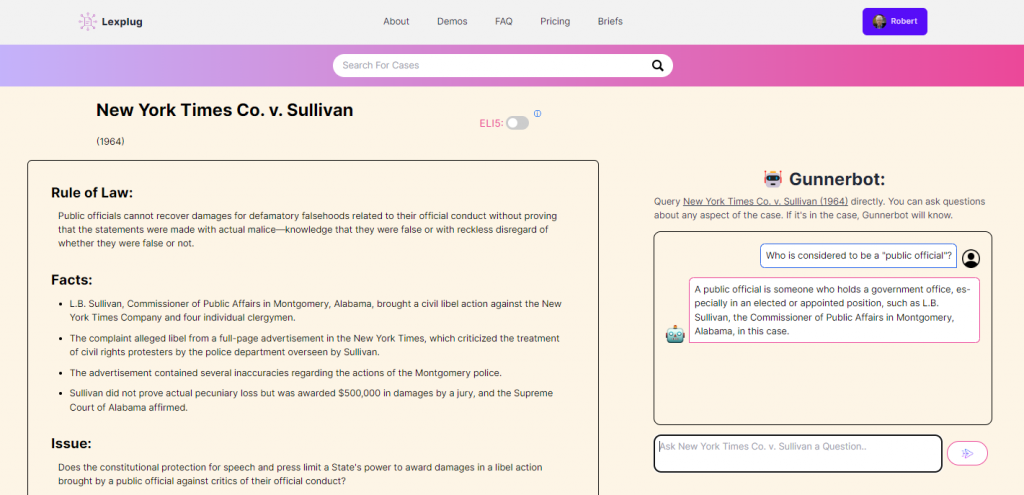[ad_1]
It was a bathroom break that inspired Bradley Neal, a 3L at The George Washington University Law School, to develop a product that uses generative AI to help law students better understand and brief cases.
Returning to class after a visit to the bathroom, he had lost the thread of the case the professor was discussing. He had not actually read the case, only a summary, and when she asked a question about it, it involved something the summary had not covered.
“I’m sitting there thinking, ‘I hope she doesn’t call on me, because that wasn’t in my summary, and I don’t know the answer,’” Neal told me.
Fearing he might be called on, he quickly found the case online, sent it to GPT-4, and asked it the question, telling it to respond based on the text of the case. In seconds, he had the answer.
That GPT-4 could so easily provide answers to questions about cases intrigued him. But then he also wondered whether it could do more, whether it could produce briefs for cases.
Based on that bathroom-break induced inspiration, Neal went on to develop — and this week launch — Lexplug, a site developed for law students “to make interacting with cases more accessible, efficient, and engaging.”
Search, Query and Simplify Case Briefs
At its core, Lexplug is a library of case briefs, all created by Neal using GPT-4. So far, he has created 7,000 briefs, and hopes to have 50,000 by the end of the year. To decide which cases to prioritize, he collected a variety of syllabi for basic law school courses such as constitutional law and torts and extracted the key cases. He also has the full text of every briefed case.
If you are tempted to try that for yourself, be aware that it took Neal a month of trial and error to get GPT-4 to reliably generate accurate and hallucination-free briefs. “We would grade each brief, we would give it a mark up to 10, and we didn’t stop until every single brief was a nine or 10.”
In addition to the briefs, Lexplug has two features to help students better understand and interact with cases: Gunnerbot, for having conversations with cases, and “Explain Like I’m 5” Mode, for simplifying legal jargon. Neal demonstrates each of these in the video above.
Gunnerbot is essentially the fully developed version of the quick query Neal did back in that law school class. It is named for gunners, a somewhat pejorative term to describe those over-eager law students who are always raising their hands.
It provides a chat interface for students to ask questions about cases when they are viewing a brief. It answers the questions based only on the text of the case, so there is little danger of it hallucinating an answer, Neal says.
The second feature, Explain Like I’m 5, a phrase often used on Reddit to ask for something to be put into layperson’s terms, enables users to “translate” case briefs into a simplified version — roughly the level of a first year college student or high school senior, Neal says — to make it easier to understand.
Launching soon is another feature that will allow users to create case briefs on the fly. If they search for a case that has not yet been briefed, Lexplug will send them to a page where they can enter the case name and citation and within 90 seconds get the brief. That in turn spins up a Gunnerbot for the case, and then both the brief and the Gunnerbot become part of the system for all users.
Initially, that will work only for U.S. state and federal cases, but Neal intends to expand it to work for agency decisions and international cases.
Lexplug offers a seven-day free trial, after which a subscription is $9 per month. Neal sees his primary competitor as being Quimbee, whose website says it has 45,500 case briefs, for which it charges $19 a month.
Not His First Rodeo
If developing a legal tech product while still in law school sounds ambitious, you should know that this is the third tech project Neal has developed while attending GW Law.
Last year, frustrated with the Supreme Court’s outdated media player for its oral arguments, the former software engineer developed a way to scrape the audio and launched a podcast, The Supreme Court: Oral Arguments. Available on Apple Podcasts and Spotify, it streams the court’s oral arguments on the day they are published, and has over 7,000 followers.
When the frequent Reddit user wanted a way to easily have voice conversations with other redditors, he developed Channel 42, a voice chat channel that creates temporary, authentication-free voice chats for up to four people.
He has also developed a Chrome extension legal research assistant, Counsel Companion. The simple app lets you tell it a story — a fact scenario — in plain English, and it will generate a set of legal search terms that you can then use on a legal research site such as Westlaw or Lexis.
If you are wondering what Neal plans to do after law school, well, he has not yet decided. Even so, it certainly seems likely he will end up doing something that involves legal tech.
[ad_2]





